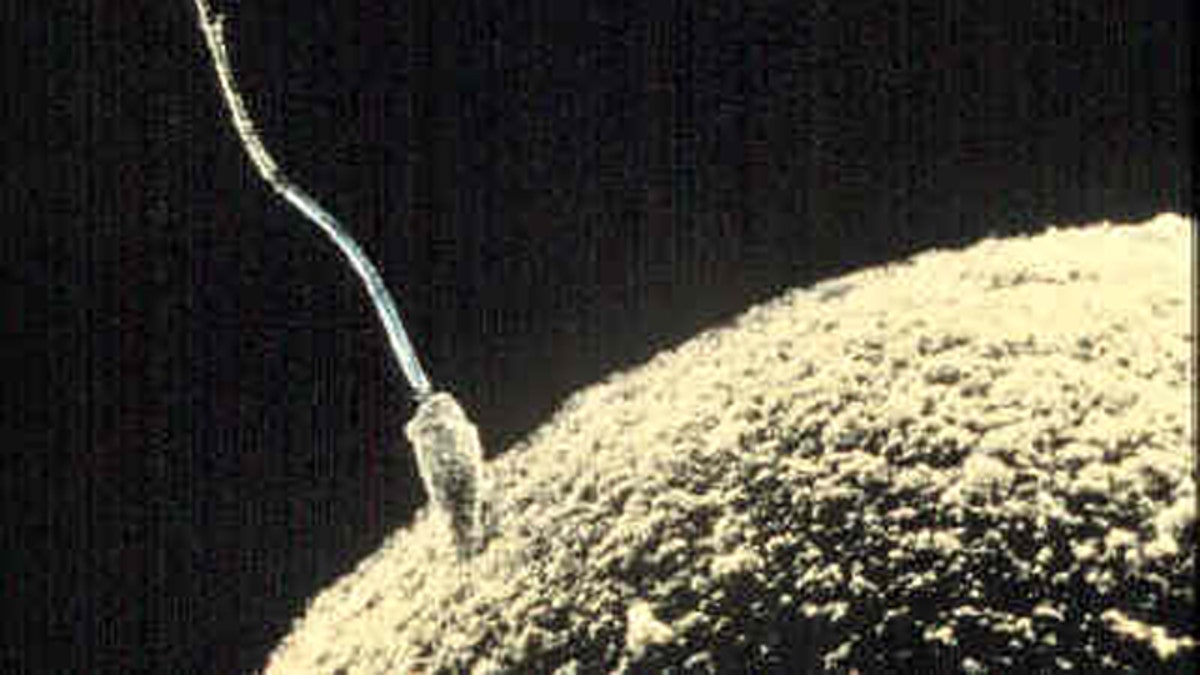
Sperm penetrating an ovum during fertilization. (Wikipedia)
For women undergoing fertility treatment, frozen donor eggs may work as well as fresh ones, a study at one fertility clinic suggests.
Researchers found that of 77 women treated at a clinic in Cyprus, those who received eggs that had been donated by another woman and then frozen were just as likely to have a baby as women given fresh donor eggs.
Forty-seven percent gave birth, versus 41.5 percent of the fresh-egg group—a difference that could have been due just to chance, the researchers report in the journal Fertility and Sterility.
The findings add to evidence that egg-freezing can work—whether it's a woman's own eggs or a donor's eggs, according to Dr. Nicole Noyes, who co-directs the egg-cryopreservation program at the New York University Fertility Center and was not involved in the study.
"This is more positive reinforcement that egg-freezing is here," Noyes said in an interview.
While it has long been possible to freeze sperm or embryos for future use in fertility treatment, the technology for freezing a woman's eggs is relatively new. Freezing eggs is trickier. The eggs tend to form ice crystals that damage their structure.
But through a modern quick-freeze process, it has become possible to keep eggs in storage and use them later.
One goal is to allow women to freeze their own eggs.
A woman might want to do that ahead of a cancer treatment that could harm her fertility. In other cases, a woman in her 30s who cannot have a baby right now, because of her career or because she doesn't have a partner, may want to freeze eggs to use in the future.
"If you're 36, and you know you won't have a baby before you're 38 because you're in med school, then it might be a good idea," Noyes said.
But there is also growing interest in creating "egg banks," akin to sperm banks, where one donor's eggs can be frozen and given to multiple recipients. A number have already popped up around the world, including the World Egg Bank, which was launched in 2005.
Right now, most women receiving donor eggs are given fresh ones.
But there are drawbacks, noted Dr. Xiao Zhang, scientific director of the Cork Fertility Center in Ireland and the senior researcher on the current study.
One is coordination, Zhang told Reuters Health in an email. That is, the recipient's uterus must be ready to receive the eggs at the same time the donor is ready to have her eggs harvested.
Another is the lack of donors. Because doctors never know how many eggs a donor will produce, they prepare no more than two women to receive fresh eggs from a single donor.
Freezing and banking donor eggs could make them more easily available to women undergoing infertility treatment, and possibly drive down costs.
For the current study, Zhang's team tested the effectiveness of egg freezing within the donor-egg program at the Pedios IVF Center in Cyprus.
The researchers assigned 77 infertile women who had volunteered for the study to receive either fresh or frozen eggs from a total of 36 donors. In each case, the researchers injected sperm from the father directly into the eggs. Any resulting embryos were implanted in the mother's uterus.
Overall, the researchers found no differences in the success of the sperm injections, the quality of the embryos, or the number of women who became pregnant with fresh or frozen eggs.
Though the findings come from one center, Noyes said they back up several other studies, including a large one from Spain published last year that included 500 women.
At the NYU center's egg-cryopreservation program, where women have their own eggs frozen, doctors have completed 46 freezing-thawing cycles. Nearly half resulted in a birth or an ongoing pregnancy, according to the center.
All of those women had their eggs frozen before the age of 40.
A recent survey found that more than half of U.S. fertility clinics now offer egg-freezing to at least some women (many exclude women older than 40, for instance).
But many clinics, Noyes noted, have frozen women's eggs but have not yet thawed and implanted them. So their success rates remain unknown.
"Egg-freezing works, at centers that know how to do it," Noyes said.
As far as cost, U.S. prices would vary according to region. But in general, Noyes said, infertility treatment using a woman's own frozen eggs could be cheaper than using fresh donor eggs, because it eliminates the several thousand dollars paid to the donor.
In New York, she said, a cycle of in vitro fertilization (IVF) using fresh eggs from a "shared" donor (as in the current study) typically costs around $16,000. If a woman wants to use an "exclusive" donor, the cost is greater.
The cost of an IVF cycle using a woman's own frozen eggs would be closer to $12,000.
The American Society of Reproductive Medicine considers egg-freezing an experimental procedure, and long-term studies are still needed to confirm its safety, Zhang said.
Worldwide, there have been about 1,000 births using frozen eggs, mostly in the last several years, no apparent increase in birth defects.
